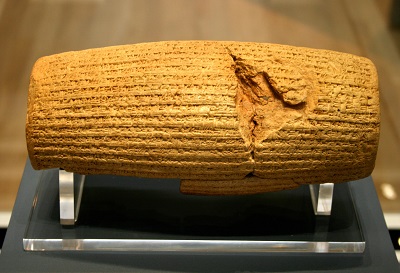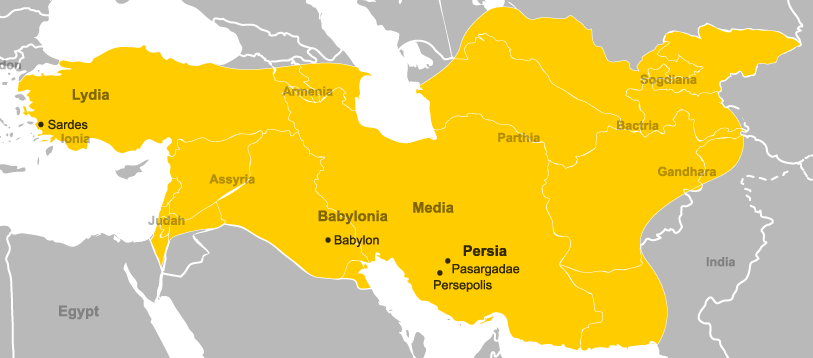Today’s installment concludes Cyrus Begins the Persian Empire,
our selection from A History of Greece by George Grote published in 1856. For works benefiting from the latest research see the “More information” section at the bottom of these pages.
If you have journeyed through all of the installments of this series, just one more to go and you will have completed a selection from the great works of seven thousand words. Congratulations!
Previously in Cyrus Begins the Persian Empire.
Time: 600 – 530 BC
Place: Near East

CC BY-SA 4.0 image from Wikipedia.
In the latter he is said to have perished, his army being defeated in a bloody battle. He was buried at Pasargadæ, in his native province of Persis proper, where his tomb was honored and watched until the breaking up of the empire, while his memory was held in profound veneration among the Persians. Of his real exploits we know little or nothing, but in what we read respecting him there seems, though amid constant fighting, very little cruelty. Xenophon has selected his life as the subject of a moral romance which for a long time was cited as authentic history, and which even now serves as an authority, express or implied, for disputable and even incorrect conclusions. His extraordinary activity and conquests admit of no doubt. He left the Persian empire extending from Sogdiana and the rivers Jaxartes and Indus eastward, to the Hellespont and the Syrian coast westward, and his successors made no permanent addition to it except that of Egypt. Phoenicia and Judaea were dependencies of Babylon, at the time when he conquered it, with their princes and grandees in Babylonian captivity. As they seem to have yielded to him, and became his tributaries without difficulty; so the restoration of their captives was conceded to them. It was from Cyrus that the habits of the Persian kings took commencement, to dwell at Susa in the winter, and Ekbatana during the summer; the primitive territory of Persis, with its two towns of Persepolis and Pasargadae, being reserved for the burial-place of the kings and the religious sanctuary of the empire. How or when the conquest of Susiana was made, we are not informed. It lay eastward of the Tigris, between Babylonia and Persis proper, and its people, the Kissians, as far as we can discern, were of Assyrian and not of Aryan race. The river Choaspes near Susa was supposed to furnish the only water fit for the palate of the great king, and it is said to have been carried about with him wherever he went.
Continued below the map.

CC BY-SA 3.0 image from Ancient History Encyclopedia.
While the conquests of Cyrus contributed to assimilate the distinct types of civilization in Western Asia — not by elevating the worse, but by degrading the better — upon the native Persians themselves they operated as an extraordinary stimulus, provoking alike their pride, ambition, cupidity, and warlike propensities. Not only did the territory of Persis proper pay no tribute to Susa or Ekbatana — being the only district so exempted between the Jaxartes and the Mediterranean — but the vast tributes received from the remaining empire were distributed to a great degree among its inhabitants. Empire to them meant — for the great men, lucrative satrapies or pachalics, with powers altogether unlimited, pomp inferior only to that of the great king, and standing armies which they employed at their own discretion sometimes against each other — for the common soldiers, drawn from their fields or flocks, constant plunder, abundant maintenance, and an unrestrained license, either in the suite of one of the satraps, or in the large permanent troops which moved from Susa to Ekbatana with the Great King. And if the entire population of Persis proper did not migrate from their abodes to occupy some of those more inviting spots which the immensity of the imperial dominion furnished — a dominion extending (to use the language of Cyrus the younger before the battle of Cunaxa) from the region of insupportable heat to that of insupportable cold — this was only because the early kings discouraged such a movement, in order that the nation might maintain its military hardihood and be in a situation to furnish undiminished supplies of soldiers. The self-esteem and arrogance of the Persians were no less remarkable than their avidity for sensual enjoyment. They were fond of wine to excess; their wives and their concubines were both numerous; and they adopted eagerly from foreign nations new fashions of luxury as well as of ornament. Even to novelties in religion, they were not strongly averse. For though disciples of Zoroaster, with Magi as their priests and as indispensable companions of their sacrifices, worshipping sun, moon, earth, fire, etc., and recognizing neither image, temple, nor altar — yet they had adopted the voluptuous worship of the goddess Mylitta from the Assyrians and Arabians. A numerous male offspring was the Persian’s boast. His warlike character and consciousness of force were displayed in the education of these youths, who were taught, from five years old to twenty, only three things — to ride, to shoot with the bow, and to speak the truth. To owe money, or even to buy and sell, was accounted among the Persians disgraceful — a sentiment which they defended by saying that both the one and the other imposed the necessity of telling falsehood. To exact tribute from subjects, to receive pay or presents from the king, and to give away without forethought whatever was not immediately wanted, was their mode of dealing with money. Industrial pursuits were left to the conquered, who were fortunate if by paying a fixed contribution and sending a military contingent when required, they could purchase undisturbed immunity for their remaining concerns. They could not thus purchase safety for the family hearth, since we find instances of noble Grecian maidens torn from their parents for the harem of the satrap.
To a people of this character, whose conceptions of political society went no farther than personal obedience to a chief, a conqueror like Cyrus would communicate the strongest excitement and enthusiasm of which they were capable. He had found them slaves, and made them masters: he was the first and greatest of national benefactors, as well as the most forward of leaders in the field: they followed him from one conquest to another, during the thirty years of his reign, their love of empire growing with the empire itself. And this impulse of aggrandizement continued unabated during the reigns of his three next successors — Cambyses, Darius, and Xerxes — until it was at length violently stifled by the humiliating defeats of Plataea and Salamis; after which the Persians became content with defending themselves at home and playing a secondary game.
| <—Previous | Master List |
This ends our series of passages on Cyrus Begins the Persian Empire by George Grote from his book A History of Greece published in 1856. This blog features short and lengthy pieces on all aspects of our shared past. Here are selections from the great historians who may be forgotten (and whose work have fallen into public domain) as well as links to the most up-to-date developments in the field of history and of course, original material from yours truly, Jack Le Moine. – A little bit of everything historical is here.
More information on Cyrus Begins the Persian Empire here and here and below.
We want to take this site to the next level but we need money to do that. Please contribute directly by signing up at https://www.patreon.com/history
Leave a Reply
You must be logged in to post a comment.